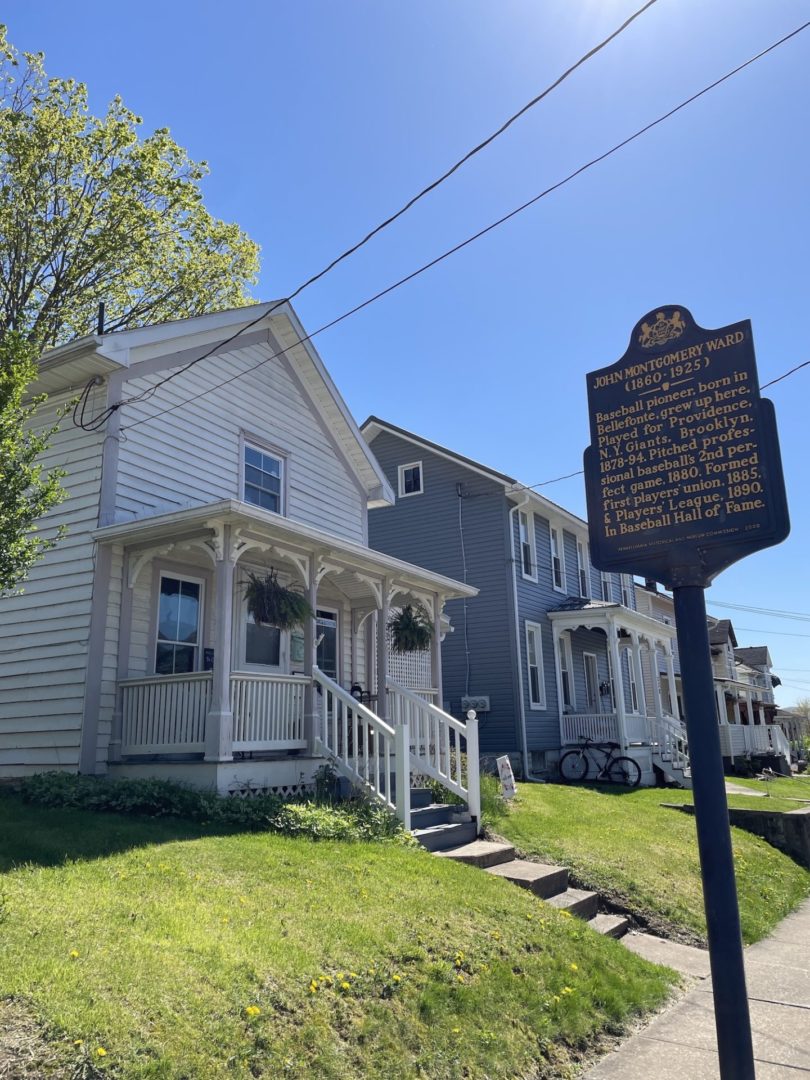The storied history of America’s greatest pastime is littered with names that spark the imagination of all sports fans. Baseball legends like Ruth, Cobb, Robinson, and Mays elicit the romanticized view of baseball’s glory days, where kids would impersonate the Bronx Bomber calling his shot or try for an over-the-shoulder deep-fly grab on the street corners of small-town America. These moments live on in our collective psyche as part of what makes baseball special. All of them, however, might never have come to be had it not been for player-turned-lawyer and Bellefonte native John Montgomery Ward.
In 1875, “Monty” Ward started his baseball career at the Pennsylvania State University at the ripe age of 15. Playing primarily as a right-handed pitching ace, Ward became famous for his development of the new “curve ball,” which was allegedly shown to him by Harrisburg pitcher Billy Hutter in a backlot following a game. Having been thrown off the Penn State team and later dropping out of college after disciplinary issues involving a dust-up with an upperclassman and chicken thievery, Ward played semi-pro baseball for the likes of Lock Haven, Williamsport, and various other railroad and coal-mining squads that were en vogue in the early years of baseball.
By the time he hit his “big break” with the National League’s Providence Grays, Ward was well on his way to becoming one of the most feared hurlers on the mound. He achieved legendary pitching status on June 17, 1880, tossing the second “perfect game” in baseball history for the Grays. He continued his career, reinventing himself as a scrappy shortstop and playing for the New York Giants, Brooklyn Dodgers, and again with the Giants, serving as each team’s manager for much of his career as well. Batting .275 for his career with over 2,000 hits, Ward was a nationally recognized player, but would become a household name for his exploits off the diamond.
While playing in Brooklyn in 1885, Ward earned his law degree from Columbia University and would immediately put that degree to good use. That same year, Ward established the Brotherhood of American Baseball Players, America’s first sports labor union designed to help support players and promote the game. His progressive attitude for players’ rights led him to challenge two of baseball’s most famed owners: Albert Spalding of the Chicago White Sox and Andrew Freedman of the New York Giants.

The issue at hand was player salary. With salaries topping out at $5,000 for Fred Dunlap of the Pittsburgh Alleghenies, Spalding aimed to get a handle on player wages by instituting a “class system” based on player evaluations from management. The best players would be designated Class A and capped at $2,500, with the lowest class earning $1,500. Vehemently against this practice, Ward fought the legendary Spalding, demonstrating that club earnings had tripled while player salaries had only increased 30% during the same time.
Ward and the players’ union continuously fought ownership over a myriad of issues for several years, culminating in the creation of the short-lived Player’s League, a rival baseball league that lured much of the National League talent away for a year while sending a resonating message to the owners.
Ward’s celebrity rose rapidly in New York. His fame on the diamond and his burgeoning law career earned him invitations from many of New York’s elite. Popular actress Helen Dauvray and Ward began courting and were eventually married, becoming one of the city’s “it” couples. Ward even found time to write baseball’s first “how-to” book aimed at children, called Base-ball: How to Become a Player, with the Origin, History, and Explanation of the Game.
In another classic courtroom drama in 1895, Ward represented future Hall of Famer Amos Rusie against New York Giants owner and Tammany Hall-connected Andrew Freedman. The grievance arose when Freedman refused to pay Rusie the remaining $200 on his yearly contract because he felt Rusie was “not trying” enough for Freedman’s liking. Rusie would sit out the following year, becoming baseball’s first “hold-out.” The hard-nosed Freedman wouldn’t relent, even when team profits dipped. Under Ward’s direction, Rusie sued Freedman for $5,000, and the standoff only ended when the other National League owners agreed to pay the settlement if he agreed to return to the mound.
It would take over 100 years to make many of the changes John Montgomery Ward was pushing for. His progressive view of the sport and its future would change baseball for every player who came after him. The great pitcher-turned-shortstop-turned-lawyer from Bellefonte was finally inducted into the Baseball Hall of Fame posthumously in 1964 for his contributions on and off the field. T&G
Sources:
Admin. (2012, January 4). Amos Rusie. Society for American Baseball Research. Retrieved May 10, 2022, from https://sabr.org/bioproj/person/amos-rusie/
Base Ball Notes. (1896, April 22). The Wilkes-Barre Record, p. 7.
Harris, A. S. (1922, August 27). John Montgomery Ward and His Time in Baseball. Pittsburgh Post-Gazette.
History. mlbpa. (n.d.). Retrieved May 10, 2022, from https://www.mlbplayers.com/history
John Ward. Baseball Hall of Fame. (n.d.). Retrieved May 10, 2022, from https://baseballhall.org/hall-of-famers/ward-john
Ward’s Debut. (1888, December 24). Daily Nebraska State Journal, p. 6.
Schmidt, Christopher W., “John Montgomery Ward: The Lawyer Who Took On Baseball” (2013). 125th Anniversary Materials. 8. https://scholarship.kentlaw.iit.edu/docs_125/8
Local Historia is a passion for local history, community, and preservation. Its mission is to connect you with local history through engaging content and walking tours. Local Historia is owned by public historians Matt Maris and Dustin Elder, who co-author this column. For more, visit localhistoria.com.




